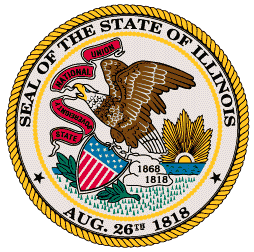|
|
 |
Legislative Inspector General Mike McCuskey
_____________________
|
|
|||||
Revolving Door - Rules, Potential Penalties, and Instructions
The Illinois “Revolving Door” statute ( 5 ILCS 430/5-45) is an anti-corruption statute aimed at preventing conflicts of interest in awarding State contracts, approving contract change orders, or making executive branch regulatory or licensing decisions.
The statute imposes a one-year “cooling off” period after leaving State office or employment during which time State personnel who in the previous year awarded, approved, or supervised those who awarded or approved, $25,000 or more in State contracts or change orders to a contractor (or a parent or subsidiary) are prohibited from accepting employment with or receiving compensation from the entity involved.
The restrictions of the statute also apply to the prohibited person’s spouse or immediate family member living with them.
Especially stringent prohibitions are placed on Members of the General Assembly and certain senior staff, including chiefs of staff and deputy, associate, and assistant chiefs of staff of offices of the General Assembly, Senate, House of Representatives, President and Minority Leader of the Senate, Speaker and Minority Leader of the House of Representatives, Senate Operations Commission, and legislative support agencies. All such persons should consult with their ethics officers regarding application to them of subsection (h) of the statute.
Violation of the revolving door statute is a serious offense and subject to an administrative fine of up to 3 times the annual compensation that would have been obtained in violation of the restrictions. Also, intentional violation of the revolving door statute is subject to criminal prosecution as a Class A misdemeanor. ( 5 ILCS 430/50-5)
If you do not know whether you are subject to the revolving door statute, contact your ethics officer.
In a nutshell:
- Subsections (a) and (h) of the statute define classes of people who are subject to the one-year cooling off period, regardless of position; and
- Subsection (c) defines a list of positions that may be subject to the cooling off restriction, subject to individualized review and determination by the LIG.
Subsection (c) requires that each legislative leader and the Joint Committee on Legislative Support Services shall adopt a policy stating which State positions under his or her jurisdiction and control, by the nature of the duties associated with those positions, may have the authority to participate personally and substantially in the award of State contracts, regardless of whether those in the listed positions actually exercise that authority. The list of people in or who were in positions subject to subsection (c) is commonly referred to as the “c” list.
Subsection (e) requires all people in positions subject to subsection (c) be notified of that status and the resulting Legislative Inspector General (LIG) notification requirement (described below) and their written acknowledgment of receipt of such notice.
LIG Notification and Review Requirement. The statute requires in subsection (f) that all those who currently serve or who within their last year of State office or employment served in legislative branch positions on a subsection “c” list must, prior to accepting an offer of non-State employment, notify the LIG for review and determination of eligibility to accept the offer. (See instructions below.)
After receiving such notification, the LIG has 10 calendar days to make a determination as to whether the Member or other State employee is restricted from accepting the employment.
LIG determinations of restriction are subject to appeal within 10 days to the Legislative Ethics Commission.
INSTRUCTIONS AND FORMS
Revolving Door Forms RD-101, RD-102, and RD-103 enable the LIG to determine whether an employee may accept a particular employment offer or compensation.
LIG RD-101 is submitted to the LIG by the Member or State employee.
LIG RD-102 is submitted to the LIG by the Member or employee’s ethics officer.
LIG RD-103 is submitted to the LIG by the prospective employer.
Instructions to Member or State Employee
(1) Fill out Form RD-101. Print out and sign the completed form and send a completed copy to the LIG via one of the two methods listed below.
(2) Provide a second completed copy of form RD-101 to your ethics officer. (Your ethics officer will need that to fill out the form RD-102.)
(3) Provide a blank form RD-103 to your prospective employer. Although the form RD-103 is not mandatory, the LIG strongly recommends timely submission of a form RD-103, as the additional information could assist the LIG when assessing your application. Your prospective employer may either return their form RD-103 to you to forward to the LIG or send it directly to the LIG by one of the two methods listed below.
The LIG is required to make a revolving door determination within 10 calendar days of receiving your notification.
Instructions to Ethics Officer
Please complete the form RD-102, sign it, and send it directly to the LIG (preferably along with a copy of the RD-101) via one of the two methods listed below within 5 calendar days after receiving the RD-101 notification.
Instructions to Prospective Employer
Please complete the form RD-103, sign it, and either return it to the applicant to forward to the LIG or send it directly to the LIG via one of two methods listed below.
How to Submit Forms to the LIG
Forms may be submitted via the U.S. Postal Service or email.
U.S. Mail: Office of the Legislative Inspector General
420 Stratton Office Building
Springfield, IL 62706
Email: LIG@ilga.gov
• Rm 420 Stratton Office Building • Springfield, Illinois 62706 • 217.558.1560 • LIG@ilga.gov • |